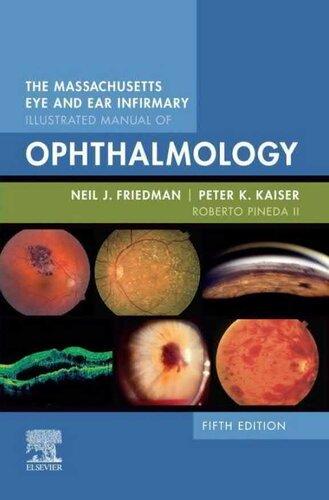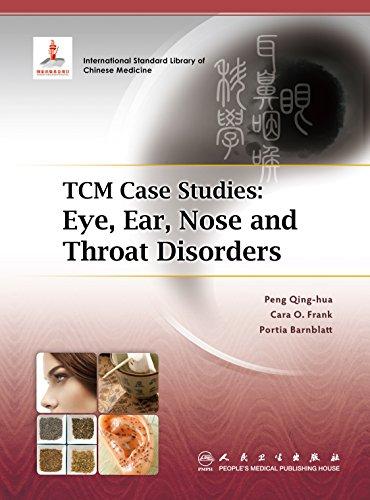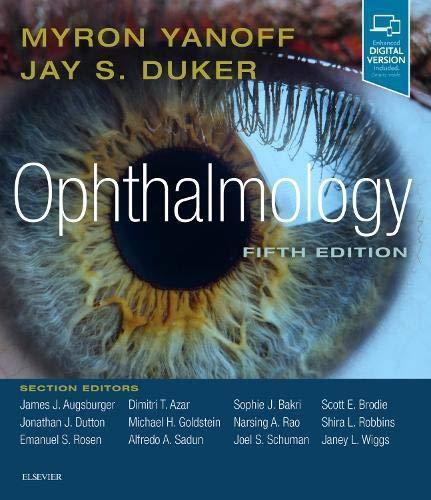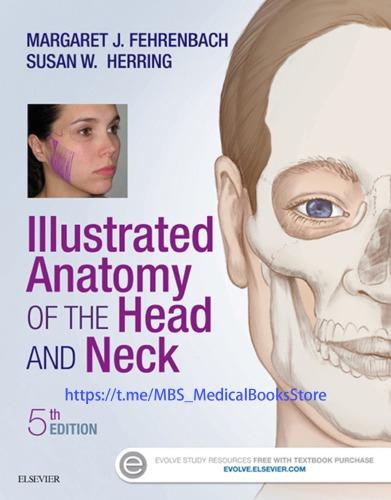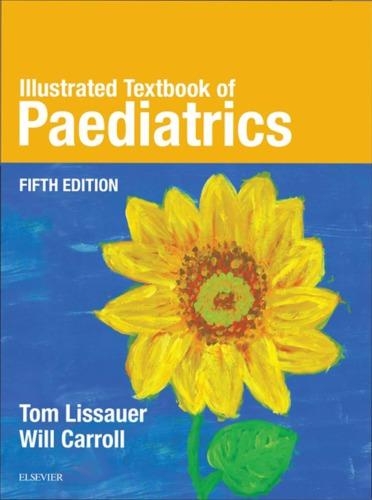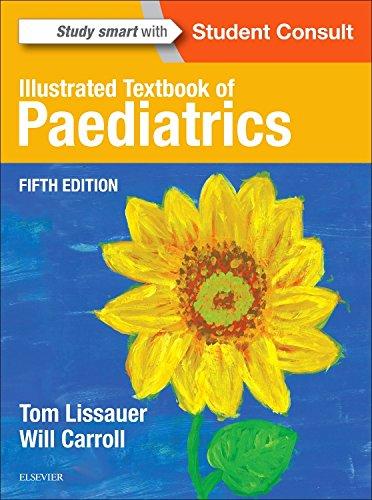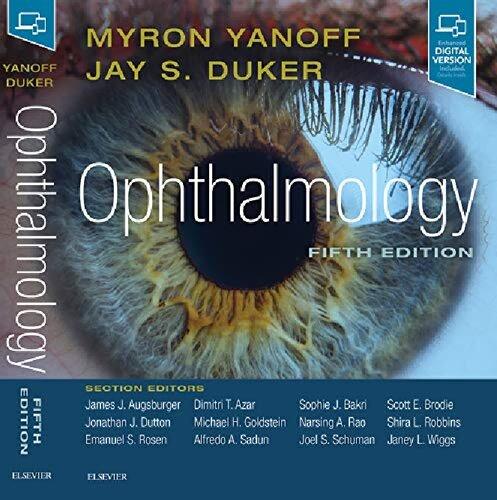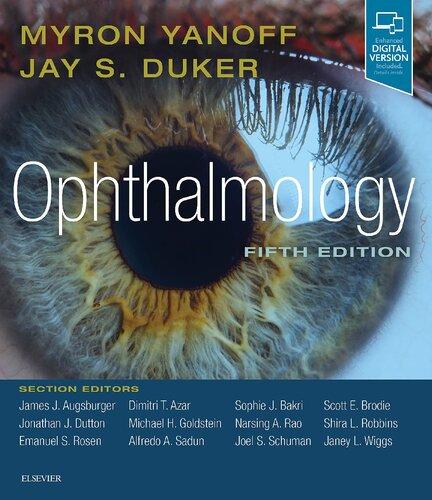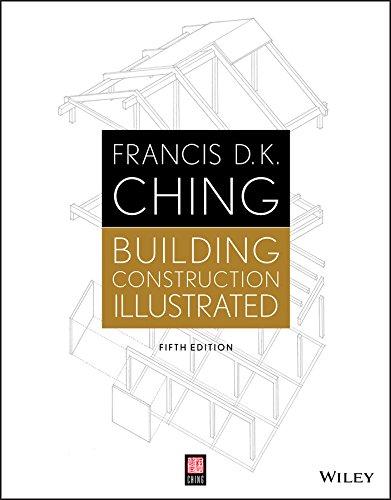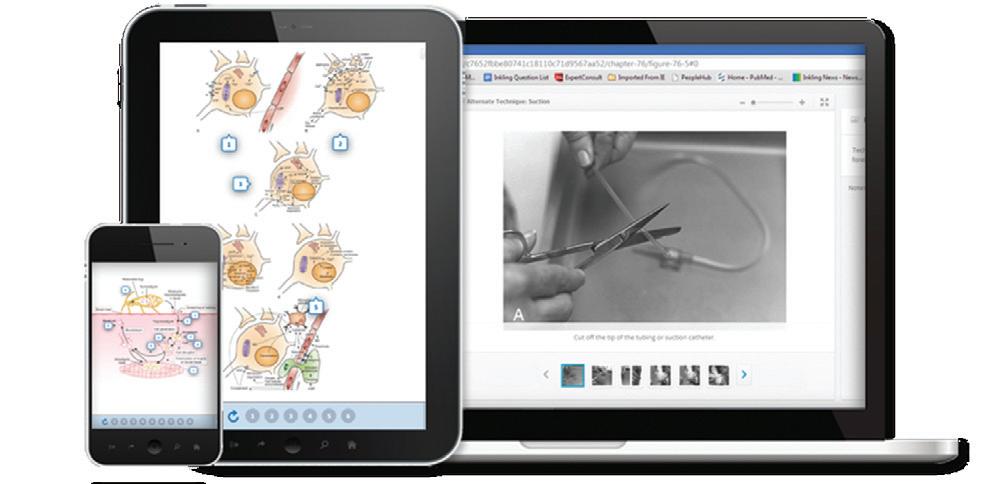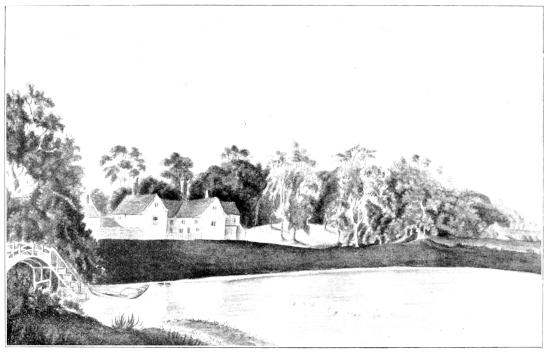Figure Courtesy Lines
The following figures are reproduced from Essentials of Ophthalmology, Friedman and Kaiser, 2007, Saunders: 2.3, 2.15, 2.22, 4.1, 4.2, 4.31, 4.45, 7.9, 7.20, 7.21, 10.144, 11.30, 12.19, Figure A.7, A.10, A.19, A.20, A.23, A.27, A.28, A.30, A.31, A.32, A.43, Table A.2, and Table A.3.
The following figures are reproduced from Review of Ophthalmology, Friedman, Kaiser, and Trattler, 2007, Saunders: 2.25, 2.26, 7.1, 7.6, A.14, A.16, A.17, A.21, and A.29.
The following figures are courtesy of the Bascom Palmer Eye Institute: 3.10, 4.3, 4.43, 4.53, 4.66, 5.8, 5.13, 5.26, 5.34, 5.40, 5.47, 5.64, 5.65, 5.71, 5.76, 5.78, 5.87, 6.10, 6.11, 6.12, 7.8, 7.14, 7.22, 7.23, 8.6, 8.37, 8.39, 8.41, 9.7, 10.1, 10.7, 10.8, 10.13, 10.32, 10.34, 10.41, 10.42, 10.43, 10.47, 10.56, 10.57, 10.64, 10.66, 10.96, 10.99, 10.100, 10.110, 10.117, 10.134, 10.148, 10.149, 10.152, 10.153, 10.154, 10.155, 10.163, 10.169, 10.204, 10.205, 10.208, 10.210, 10.222, 10.223, 10.237, 10.239, 10.244, 10.246, 10.247, 10.248, 10.251, 10.260, 10.262, 10.263, 10.264, 10.265, 10.266, 10.267, 10.272, 10.273, 10.274, 10.276, 10.277, 11.15, 11.18, and 11.21.
The following figures are courtesy of the Cole Eye Institute: 1.3, 1.28, 1.32, 1.33, 1.34, 1.35, 3.3, 3.11, 3.14, 3.19, 3.22, 3.23, 3.37, 3.49, 3.52, 3.56, 3.65, 4.8, 4.20, 4.25, 4.29, 4.32, 4.40, 4.41, 4.44, 4.50, 4.55, 4.56, 4.58, 4.65, 4.68, 5.5, 5.6, 5.12, 5.25, 5.35, 5.38, 5.39, 5.42, 5.43, 5.51, 5.57, 5.61, 5.68, 5.92, 5.99, 5.100, 5.101, 5.102, 6.13, 6.14, 7.17, 7.31, 7.39, 7.46, 8.4, 8.8, 8.9, 8.10, 8.11, 8.21, 8.24, 9.2, 9.6, 10.2, 10.14, 10.18, 10.19, 10.20, 10.21, 10.22, 10.23, 10.25, 10.28, 10.30, 10.31, 10.35, 10.36, 10.37, 10.38, 10.44, 10.46, 10.48, 10.49, 10.50, 10.52, 10.58, 10.59, 10.61, 10.62, 10.67, 10.73, 10.76, 10.77, 10.78, 10.79, 10.93, 10.95, 10.97, 10.98, 10.102, 10.103, 10.105, 10.106, 10.108, 10.115, 10.121, 10.123, 10.124, 10.125, 10.131, 10.132, 10.135, 10.137, 10.138, 10.139, 10.140, 10.141, 10.145, 10.146, 10.147, 10.151, 10.157, 10.159, 10.160, 10.161, 10.162, 10.164, 10.165, 10.166, 10.167, 10.168, 10.171, 10.172, 10.174, 10.175, 10.179, 10.181, 10.182, 10.185, 10.188, 10.189, 10.190, 10.191, 10.192, 10.193, 10.194, 10.197, 10.198, 10.199, 10.200, 10.201, 10.202, 10.203, 10.207, 10.211, 10.214, 10.215, 10.217, 10.218, 10.219, 10.220, 10.221, 10.226, 10.227, 10.228, 10.230, 10.231, 10.232, 10.236, 10.241, 10.249, 10.254, 10.257, 10.258, 10.261, 10.269, 10.270, 10.271, 10.275, 11.1, 11.2, 11.3, 11.4, 11.12, 11.16, 11.17, 11.23, 11.24, 11.34, 11.37, 12.5, 12.9, 12.12, 12.13, and 12.14.
The following figures are courtesy of the Massachusetts Eye and Ear Infirmary: 1.2, 1.8, 1.10, 1.11, 1.12, 1.13, 1.14, 1.15, 1.16, 1.21, 1.29, 1.36, 2.1, 2.2, 2.4, 2.7, 2.10, 2.11, 2.12, 2.20, 2.23, 2.24, 3.5, 3.8, 3.12, 3.13, 3.17, 3.20, 3.21, 3.24, 3.29, 3.41, 3.47, 3.48, 3.57, 3.63, 3.64, 3.68, 4.4, 4.5, 4.6, 4.9, 4.12, 4.13, 4.15, 4.16, 4.17, 4.18, 4.19, 4.26, 4.27, 4.30, 4.33, 4.34, 4.37, 4.38, 4.39, 4.49, 4.51, 4.52, 4.57, 4.59, 4.61, 4.62, 4.63, 5.2, 5.7, 5.15, 5.16, 5.17, 5.18, 5.21, 5.22, 5.23, 5.29, 5.30, 5.36, 5.37, 5.41, 5.44, 5.45, 5.52, 5.55, 5.56, 5.60, 5.62, 5.72, 5.74, 5.75, 5.78, 5.88, 5.89, 5.93, 6.1, 6.2, 6.5, 6.8, 6.15, 7.2, 7.4, 7.7, 7.10, 7.12, 7.16, 7.24, 7.27, 7.29, 7.30, 7.33, 7.36, 7.37, 7.38, 7.40, 7.42, 7.43, 7.44, 7.45, 7.48, 8.1, 8.3, 8.5, 8.7, 8.12, 8.13, 8.15, 8.16, 8.17, 8.18, 8.22, 8.23, 8.27, 8.40, 8.42, 8.45, 9.1, 9.3, 10.29, 10.45, 10.65, 10.68, 10.69, 10.71, 10.116, 10.127, 10.128, 10.129, 10.130, 10.142, 10.150, 10.158, 10.170, 10.173, 10.178, 10.179, 10.180, 10.184, 10.196, 10.206, 10.209, 10.225, 10.229, 10.238, 10.240, 10.242, 10.243, 10.245, 10.250, 11.5, 11.6, 11.7, 11.10, 11.13, 11.26, 11.29, and 11.35.
The following figures are courtesy of the New York Eye and Ear Infirmary: 3.7, 3.16, 3.34, 3.39, 3.59, 4.13, 4.21, 4.35, 4.37, 4.46, 4.47, 4.48, 4.54, 4.60, 4.64, 5.14, 5.46, 5.48, 5.49, 5.50, 5.53, 5.54, 5.59, 5.73, 5.95, 5.98, 7.3, 7.9, 7.11, 7.13, 7.26, 8.14, 8.28, 8.36, 8.38, 8.44, 9.5, 9.10, 10.3, 10.10, 10.11, 10.12, 10.17, 10.24, 10.30, 10.33, 10.51, 10.63, 10.92, 10.114, 10.156, 10. 186, 10.187, 10.195, 10.206, 10.212, 10.224, 10.233, 10.234, 10.235, 11.11, and 11.20.
The following figure is courtesy of Shamik Barfna, MD: 12.16.
The following figures are courtesy of Michael Blair, MD: 10.279 and 10.280.
The following figure is courtesy of Robert Chang, MD: 5.97.
The following figures are courtesy of Warren Chang, MD: 2.8 and 2.9.
The following figure is courtesy of Netan Choudhry, MD: 10.133.
The following figures are courtesy of Cullen Eye Institute: 1.7, 5.82, and 11.14.
The following figure is courtesy of Eric D. Donnenfeld, MD: 3.6.
The following figures are courtesy of Jay Duker, MD: 10.176 and 10.177.
The following figure is courtesy of Chris Engelman, MD: 11.38.
The following figures are courtesy of Neil J. Friedman, MD: 1.6, 1.9, 4.10, 4.11, 4.69, 5.3, 5.4, 5.11, 5.19, 5.28, 5.31, 5.66, 5.67, 5.77, 5.86, 6.3, 7.5, 7.15, 7.47, 8.19, 8.25, 8.26, 8.30, 8.31, 10.9, 11.22, 11.27, 11.31, 11.32, 11.33, 11.36, 12.4, 12.6, 12.7, 12.8, 12.15, 12.20, A.34, A.35, A.42, A.44, and A.45.
The following figures are courtesy of Ronald L. Gross, MD: 5.70, 6.4, 6.7, 6.9, 7.25, 7.28, 7.34, and 11.23.
The following figures are courtesy of M. Bowes Hamill, MD: 4.7, 4.25, 4.27, 4.41, 4.66, 5.9, 5.10, 5.81, 7.32, and 7.35.
The following figures are courtesy of Allen Ho, MD: 10.163, 10.183, and 10.255, 10.256.
The following figure is courtesy of Thomas N. Hwang, MD, PhD: 11.9.
The following figures are courtesy of J. Michael Jumper, MD: 10.128 and 10.129.
The following figures are courtesy of ATul Jain, MD: 6.6, 9.4, 10.15, and 10.16.
The following figures are courtesy of Peter K. Kaiser, MD: 2.13, 2.16, 2.19, 2.21, 9.8, 9.9, 10.4, 10.5, 10.6, 10.26, 10.27, 10.39, 10.40, 10.53, 10.54, 10.55, 10.70, 10.74, 10.75, 10.80, 10.81, 10.82, 10.83, 10.84, 10.85, 10.86, 10.87, 10.88, 10.94, 10.101, 10.104, 10.107, 10.109, 10.111, 10.112, 10.113, 10.116, 10.118, 10.119, 10.120, 10.136, 10.143, 10.212,
10.216, 10.268, 11.16, 11.19, A.1, A.2, A.3, A.4, A.6, A.8, A.9, A.11, A.12, A.13, A.15, A.18, A.22, A.24, A.25, A.26, A.38, A.39, A.40, and A.41.
The following figures are courtesy of Robert Kersten, MD: 3.51, 3.62, and 3.66.
The following figures are courtesy of Jonathan W. Kim, MD: 1.25, 1.26, and 3.43.
The following figure is courtesy of John Kitchens, MD: 10.60.
The following figures are courtesy of Douglas D. Koch, MD: 5.33, 5.69, 8.2, 8.20, 8.29, 8.32, 8.33, 8.34, 8.35, 8.43, 12.11, and 12.18.
The following figures are courtesy of Andrew G. Lee, MD: 2.14, 2.17, 2.27, 7.18, 11.1, and 11.8.
The following figures are courtesy of Peter S. Levin, MD: 1.23, 3.9, 3.30, 3.38, 3.58, 3.60, 3.61, and 3.67.
The following figure is courtesy of Thomas Loarie: 12.17.
The following figure is courtesy of Edward E. Manche, MD: 12.10.
The following figure is courtesy of Samuel Masket, MD: 12.2.
The following figures are courtesy of Timothy J. McCulley, MD: 1.1, 1.5, 1.18, 1.20, 1.21, 1.22, 1.24, 1.30, 1.31, 3.2, 3.4, 3.25, 3.44, 3.45, and 11.25.
The following figure is courtesy of George J. Nakano, MD: 5.94.
The following figures are courtesy of James R. Patrinely, MD: 1.17, 1.27, 3.18, 3.28, 3.31, 3.32, 3.33, 3.35, 3.36, 3.40, 3.42, 3.50, 3.53, 3.54, and 3.55.
The following figures are courtesy of Julian Perry, MD: 3.1 and 3.46.
The following figures are courtesy of Roberto Pineda II, MD: 5.20, 5.27, 5.32, 5.90, 5.91, 5.96, A.33, A.36, and A.37.
The following figures are courtesy of David Sarraf, MD, and ATul Jain, MD: 10.122, 10.126, 10.260, 10.261, and 10.262.
The following figures are courtesy of Richard Spaide, MD: 10.89, 10.90, and 10.91.
The following figures are courtesy of Paul G. Steinkuller, MD: 1.19, 2.5, 2.6, and 12.1.
The following figures are courtesy of Christopher N. Ta, MD: 3.15, 3.26, 3.27, 4.21, 4.22, 4.23, 5.1, 5.24, 5.58, 5.63, 5.85, 7.41, and 12.3.
Another random document with no related content on Scribd:
departure, feeling most sensibly the loss of his society. I have been occasionally connected with him since, and shall always hold him in great estimation for his learning, his talents, and sincerity of friendship. My son was under his tuition for some years. In the following letter my brother describes the state of this nation, which he thinks miserably bad:—
‘Eton College: Oct. 31, 1782.
‘Dear Arthur,—I wrote to you three days ago, and yesterday I received yours, complaining that I write no politicks. If you can, I cannot think of them with any degree of patience. We are a ruined people, tearing ourselves to pieces, everyone thinking of his party and himself, and no one caring for the publick, and that is the truth whatever you may hear or read. There is not a blockhead in England, who can only read and write and some who can only sign their names, of whom I could give you instances, who does not think himself qualified to new model the constitution. All true regard for liberty, and law, and a free government is gone, and there seems to be a general resolution not to be governed at all, which must end in despotism. We have no Ministry, nor do I see how we can have any. The whole summer has been spent in enlisting recruits against the winter. The friends of the old Ministry give out that Lord North has the decisive votes, which I think may be true. He was very lately unengaged, and, I am glad to hear, has declared positively against all innovations. For I am sure there is neither honesty, nor knowledge, nor abilities in this generation, to be trusted with altering our constitution. There are but two modes of governing—by power, or by influence. I desire to be governed by influence, but not that the influence may be so great as to be equivalent to power. I think that the Bill,[82] taking away the votes of the Revenue officers, will have great effect if ever executed, and am against proceeding further till I see the consequences of that Bill. I would annihilate the enormous plates in the Exchequer, but that would not much affect the influence of the Crown. As to increasing the Navy what do you mean? Can you possibly increase your Navy without increasing the
number of your seamen? And can you increase them without increasing your trade? You have already more ships than you can man. When your silly Suffolk scheme of building a ship was first mentioned to Lord Keppel, he said: If they could find him seamen he should be obliged to them, for he had ten more ships ready if he had seamen to put into them. We have got into one of those stupid wars which the Tories have always clamoured for, a naval war with France, without any land war in which our men might die in German ditches; we pay no subsidies to German princes for defending themselves, and you see how it has succeeded. The French having no diversion of their wealth to a land war are superior at sea, as any man of common sense might have foreseen. If your Suffolk gentry would take care of their own duty and suppress the smuggling on their coast, it would be well. The Parliament will supply Government with money, levied equally on the subject, to build ships as they are wanted; and Government is by common law armed with power to avail itself of every seaman in the country; and that is the only just and equitable way of providing a Navy.
‘I shall be in town next month, and will call on our Aunt Ingoldsby. I am sorry to hear that my mother’s memory fails so fast; it frightens me out of my wits every time I forget anything.
‘Yours very affectionately,
‘J. YOUNG. ’
CHAPTER VI
FIRST GLIMPSE OF FRANCE, 1783-1785
Birth of Bobbin—Ice baths—‘The Annals of Agriculture’—A group of friends— Lazowski—First glimpse of France—Death of my mother—The Bishop of Derry Fishing parties Rainham.
On May 5 of this year my dear Bobbin was born.[83] I passed the year at Bradfield, and was much in the society of many neighbouring gentlemen. At this time I was a desperate bather, going into the water every morning at four o’clock each winter, and with or without the obstruction of a thick coat of ice, having often to break it before I could bathe. All my friends much condemned the practice, and assured me that I should kill myself, but it became so habitual that their prophecies were vain. As soon as I was out of bed I continued my favourite practice, walking about two hundred yards to a bath I had constructed, and plunging in, notwithstanding the inclemency of the weather.
I had this year a severe fever, which occasioned several of my friends, with all the acrimony that a departure from the usual modes of life occasions, strongly to dissuade me from persisting in my scheme. I myself was firmly persuaded that it was not, as they declared, the cause of my illness, and therefore when I was perfectly recovered resumed the practice, which I continued for many years; and I once at Petworth, at Lord Egremont’s, went into the bath at four in the morning, when the thermometer was below zero. Upon coming out, walked into the shrubbery, and rolled myself in the snow as an experiment to see the effect on my body; it had none,
except that of increasing strength and activity, and was not at all disagreeable.
In January commenced one of the greatest speculations in my life —the publication of ‘The Annals of Agriculture.’ I had long meditated such a work, and corresponded upon it with Mr. Whyman Baker, of Ireland, who had promised communications. The plan which first suggested itself was peculiar, and to the exclusion of all private profit with a constant publication of the printing and publishing accounts —but the booksellers applied to, rejected the idea, and the work appeared monthly, with very indifferent success, for about a twelvemonth. The correspondence being highly respectable, and no papers inserted without the name and place of abode of the writer, it rose gradually to the support of itself, and after a time enabled me to insert a great number of plates. It would have proved a very profitable publication but for the many numbers which were obliged to be reprinted. Printing only 500 afterwards occasioned reprinting another 500, still a third 500. This created so large an expense that it swallowed up everything that wore the resemblance of profit, and many years afterwards I continued reprinting various numbers for the sole object of completing sets; this formed a back current; which carried away what would have been profit. It may be added that many of those papers written by myself, forming perhaps a third or fourth of the whole work, may be reckoned among my most valuable productions, and have received the sanction of approbation, by being translated into several foreign languages. It is an anecdote which cannot be generally known, that two very able letters, which came under the name of Robinson, the King’s shepherd at Windsor, were really the production of his Majesty’s own pen, describing what he had long been intimately acquainted with, the husbandry of Mr. Ducket. The King took in two sets of the work, one of which he regularly sent to that farmer; and in the interview which I had with his Majesty upon the terrace of Windsor, the first word the King said to me was: ‘Mr. Y., I consider myself as more obliged to you than to any other man in my dominions,’ and the Queen told me that they never travelled without my ‘Annals’ in the carriage. Lord Fife informed me that he himself always had the ‘Annals’ sent him the
moment they were published, but still he always found that the King was beforehand with him, for upon the first of the month, while the number was unopened upon his table, riding out and meeting his Majesty, he at once spoke to him on a paper of his own (Lord Fife’s) in that number, showing that he had read the whole before it had met the eye of the author.
Among the letters I received this year the following may be particularly noted:
‘Londonderry: April 23,1783.
‘A thousand thanks to you, my dear friend, for your recollection of me at so many miles’ distance, and for your summary Gazette of the present miscellaneous state of our neighbours, but no thanks at all to you for wishing me back to the foggy, fenny atmosphere of Ickworth, in preference to the exhilarating and invigorating air, or rather ether, of the Downhill. When you are vapid, if ever those pétillant spirits of yours are so, come and imbibe some fixed or unfixed air at the Downhill, where a tree is no longer a rarity, since above 200,000 have this winter been planted in the glens round my house; come and enjoy the rapidity and the success with which I have converted sixty acres of moor, by the medium of two hundred spades, into a greencarpet, sprinkled with white clover. Am I not an adept in national dialect? Come and enjoy some mountain converted into arable, and grouse metamorphosed without a miracle, into men; come and teach a willing disciple and an affectionate friend how to finish a work he is barely able to begin.
‘In all my leases to the tenants of the See, I have providently, and with a long forecast, made a reservation to myself of all the bog and mountain lands deemed unprofitable. Well, these I am enabled by statute to grant in trust for myself during sixty-one years. Now is the moment to execute this great purpose; the reserved acres amount to several thousands, and upon one mountain only I have received proposals for building 200 cabbins (cabins); the limestone is at the bottom of the hill, and the turf at the top. What gold may not this
chemistry produce, and who do you think would himself submit to vegetate at Ickworth whilst he can direct such a laboratory at the Downhill?
‘Can Ashby crawl—Quantummutatusabillo?I shall next expect to hear of Arthur’s creeping. Mure I knew always to be a prince in his ideas; I am glad to hear he is able to be so in his works. Cullum can dignify any subject, and interest his reader in the most insignificant, so I conclude we all read even his Hawstead Antiquities with pleasure and instruction. But what is Symonds[84] about? not six yards round I hope like Falstaff—l.[85] Pray ramble once more to Ireland either by the proxy of a letter or in person. You will ever be welcome to your affectionate friend,
‘BRISTOL. ’
This year Arthur Young, an American prisoner, wrote to me asking charity; it deserves to be mentioned that in a book called ‘England’s Black Tribunal’[86] there is a list of emigrants to America in the seventeenth century, at the head of whom stands the name of Arthur Young. The following letters are from James Barry,[87] the celebrated painter. This was a very singular character. I sat to him for the portrait which he inserted in his famous painting for the decoration of the Society’s room.[88] I met him often at Dr. Burney’s, and always found him to abound with original observations, which marked a character peculiarly his own. He always seemed to me to be proud of his poverty.
‘Adelphi: April 1783.
‘Dear Sir,—I am very much obliged to you for your kind letter, and hope your goodness will make every allowance for my not having answered it sooner, but of all things I hate writing at any time, more particularly at present, when I had resolved to allow myself some days’ Sabbath, to the utter exclusion of all manner of labour, even of that which was most agreeable to me. I shall be sincerely obliged to you for your corrected copy of my account of the pictures,[89] and the freer and the more extensive your strictures are the more
thankful I shall be; whatever is for use shall be adopted, and I will further promise you that whatever may not be to the purpose shall be thrown aside with as little reluctance as if I had written it myself. I expect to find you on a wrong scent in what you call my violence, which you may think has been carried too far, and I shall have a pleasure in setting you right as to that matter the first time we meet. You will find nothing has arisen from resentment, nothing from a desire of retaliating, nothing from paltry, interested views; such motives, though I might be inclined to make allowance for them in others, I should reprobate in myself. It appeared to me a bounden duty to point out for the common good whatever I could discover of those quicksands, shoals, and rocks that obstruct and endanger our viaggiatoriin the bellearti, and I am confident that the arts and the reputation of the country will receive essential service, whenever this chart (of which I have made but a rude sketch) shall be perfected by some man of more information and better abilities (though perhaps not of more love for truth, for the public and for science) and of penetration, energy, vivacity and perspicuity, to treat this matter as it deserves.
‘Though I don’t wish to hurry you, yet I hope your copy will come soon; I accept your terms, or rather I insist upon them, but do not content yourself with what you may have written in the margin, in which, upon this occasion, I am sorry to believe you must be straitened for want of room; however, you can stick papers between the leaves, and in charity spare not the rod, as it may save the child. I have on all hands got more praise than I well know what to do with, and something else may now be more profitable to me.
‘In what you say of yourself I feel for the country—the loss is theirs, not yours. God Almighty has so ordered matters in this world that it is praiseworthy and honourable when genius and abilities will struggle to exert themselves for the service of others; it was for this end they were given, and with the consciousness of these honest and dutiful endeavours such men must be contented, and, indeed, ought to be happy, as no more can depend upon themselves. Others are to be accountable, and to receive glory or infamy for what is
done on their part in the assistance or the obstruction they may have flung in the way. Farewell!
‘Yours most affectionately,
‘J. BARRY. ’
‘Adelphi: July 1783.
‘Dear Sir,—I am delighted with your account of Ireland, ’tis wise, candid, bold, exceedingly humane, and just what the nature of the case required. I have long been sick at heart of the timid, trimming, mistakingly prudent, and palliating conduct of those writers who have been hitherto quacking and dabbling with the sores and miseries of that country, and was without the least hope of ever seeing this matter undertaken by any man of such sufficient courage, philanthropy, or charity (which are indeed but different points of view of the same virtue), as might obtain for us a fair, open and entire exposition of this unexampled and very melancholy case. Judge, then, what a pleasure I am receiving in the perusal of your book. You have, I find, probed the evil to the bottom, and left me without a wish. The men of Ireland are surely much indebted to you, and will, I trust, one day acknowledge it, but for the present you must have patience and ought to bear with them, as the illiberality or meanness you may justly complain of may fairly be ascribed to an unhappy combination of circumstances, owing principally to the tyrannical monopolising disposition and rascally interference of your own forefathers, who had with the most abominable and diabolical policy employed their whole skill and power utterly to erase from the minds of Irishmen all those noble and generous feelings which were incompatible with a servile and enslaved condition, and which ultimately estranged them from the exercise of even the ordinary vulgar virtues.
‘In situations where men are divided into large bodies of tyrants and slaves, little good is to be expected. Their vices may differ, but they are all equally remote from virtue, truth, justice, gratitude, the love of excellence, or any other of those qualities which constitute the real dignity of human nature. Those who are attached to no
country or description of men, but for the ends and furtherance of humanity, by equal justice and happiness, will with me rejoice and give Almighty God thanks for the dissolution of whatever has hitherto obstructed the growth and spreading of virtue, and for that just sense of the human dignity which is now diffusing itself so extensively in Ireland, and gives fair prospect of a plentiful harvest (in due season) of those other virtues which, though but thinly scattered in England, are at present, I fear, in vain to be sought for anywhere else.
‘Yours most affectionately,
‘JAMES BARRY. ’
At this period commenced a most agreeable acquaintance with a French gentleman who came to Bury, and I must dilate a little on the origin of his journey. The Duke of Liancourt[90] was Colonel of a French regiment, the quarters of which were at Pont à Mousson, in Lorraine, to which he went every year, according to the regulations of the French army. At that place he accidentally met Monsieur de Lazowski,[91] son of a Pole, who came to Lorraine with King Stanislas. The Duke was so struck with his manner and conversation that he resolved to cultivate his acquaintance. About that time he was in want of a tutor for his two sons—not for the common purposes of education, but to travel with them. He accordingly engaged Lazowski to make the tour of France with these lads, the Count de la Rochefoucault and the Count Alexander de la Rochefoucault. The Duke thought it an important part of education to become well acquainted with their own country. During two years they travelled over the greatest part of the kingdom on horseback. The Duke was so well pleased with the conduct of Lazowski on this journey that, having determined to send his sons to England in order to acquire the language of that country, and, generally, in compliance with the Anglomania which then reigned in France, he continued Lazowski in his situation and sent them all three to England. Among other objects in France, Lazowski had given some attention to agriculture, particularly in its connection with political economy. On his arrival in London he made enquiry who could most probably give him
information relative to agriculture, manufactures, commerce and other national objects. Among others I was named to him by some person who was so partial in his representations that he at once determined to fix at Bury for a short time, which he understood was the nearest town to my country residence. He and the two young men went to the Angel Inn, from thence hired convenient apartments, and enquired where I resided. At that time I was absent, and Mr. Symonds, understanding that two young men of fashion from France were at Bury, introduced himself and showed them various civilities, and when I returned brought them over to Bradfield. From that time a friendship between me and Lazowski commenced, and lasted till the death of the latter. He was about forty years of age, and in every respect a most agreeable companion. He soon made rapid progress in the English language, which he spoke not only with fluency, but often with extreme wittiness. There was not in his mind any strong predominant cast; but the grace and facility of his manner, with suavity of temper, made him a great favourite, and being also highly elegant and refined, he often produced impressions which were not easily effaced. From his general conversation in mixed society it was not readily concluded that he could or would attend with great industry and perseverance to objects of importance. But this would have been erroneous, for he exerted the greatest industry in making himself a master of all those circumstances which mark the basis of national prosperity, and he formed in his own mind a very correct comparison of the resources both of Britain and France. He often expressed to me much surprise at what he thought on this subject in England, and declared that the ignorance of the French relative to their great rival was most profound. The Duke of Liancourt was highly gratified by his correspondence, and after he had resided some time, first at Bury and afterwards with Mr. Symonds, he was directed to take the young men a tour through England and Scotland, which he did. The Duke himself came over on a visit to Symonds while his sons and their tutor were in the house. Soon after his arrival in England, hearing that there were such carriages at Bury as were called buggies, and desiring to make use of all sorts,
he ordered one to be hired to convey him and Lazowski to Bradfield. On its coming to the door, Lazowski perceiving that, though it was drawn by one horse only, it ran upon the quarter,[92] he would have persuaded the Duke not to attempt driving, as it would be 20 to 1 that he would overthrow it; but the Duke, full of presumption, held such prudential advice in contempt, and, whipping away, had not gone half a mile in a cross road before he overturned the carriage, and in the fall dislocated his shoulder. The Duke was conveyed to Symonds. Lazowski instantly rode off to inform me of the accident, and the Duke expressed no more desire to drive carriages he had never seen. Lazowski’s connection with the Duke was not put an end to when the education of his sons was finished; he was so useful that he continued his salary and an apartment in the Hôtel de la Rochefoucauld, Paris, and I often admired the independent spirit with which he lived in the family. A dinner did not often pass without an argument between him and the Duke, which was carried on with a great deal of heat on both sides. On such occasions Lazowski never gave up the shadow of an opinion, and being gifted with more natural fluency than the Duke, he had usually the better of the argument. This was equally to the credit of both. His employment was chiefly drawing up memorials upon political subjects for the Duke’s information, who was a vain man, and, without doubt, figured in conversation by this subsidiary assistance. His vanity appeared in one circumstance in which he attempted much more than he could perform. While he was in the bath, or dressing by his valet de chambre, he had three secretaries, to whom he pretended to dictate at the same time. One of them told Lazowski that it was scarcely credible how they were fatigued by his incessant blunders. Yet in France, perhaps, this very attempt gave a sort of reputation. It was suspected that he merely attempted this in imitation of Cæsar, who did the same thing, but in a very different manner, it is presumed, from the D. de Liancourt. With a view similar to that of retaining Lazowski, he gave an apartment to Jarré, an officer who had long been in the Russian service, and afterwards became famous for burning the suburbs of Courtray. He was well known in England as General Jarré, and placed at the head of the Military
Asylum at Wycombe. While I was in France, M. Jarré published an octavo volume under the title of ‘Crédit National,’ a whimsical work, in which the arguments were very ill supported. Lazowski always showed me great friendliness, and I returned it with great constancy and truth. Among all the men I met with in France, attached to the higher classes or constituting them, all were infidels, and poor Lazowski of the number. He never lost himself so completely as when he entered into an argument upon the truth of Christianity with the Bishop of Llandaff, for, though civilly done, the Bishop ground him to powder. The latter, of course, thought him nothing but a frothy Frenchman, like most of his countrymen, with Voltaire in his head and the devil in his heart, all of whom would have talked the same language had they had the same opportunity. Before Lazowski and his pupils had learnt English, Symonds took them to Cambridge, and introduced them to the Bishop, who, understanding that the young men were of high rank in France, and knowing that he spoke French himself with difficulty, put on his canonicals to receive his foreign guests, and, entering the room with a most stately air, addressed them all in Latin, hinting to Symonds the propriety, as Latin was the language of that learned University, and, therefore, in using it he was classically right. The Frenchmen, of course, replied with plenty of bows and grimaces to every learned sentence rolled out in most majestic tone from the Bishop’s mouth, but giving no other answer. The Bishop was at last compelled to address them in his broken French: ‘Latin, gentlemen, is our language here, but perhaps you had rather I should speak in bad French than not use that language at all!’ and then relaxing his episcopal dignity, he conversed with them at ease and quieted their ruffled spirits.
1784. This year I took a journey with my son for farming intelligence into Essex and Kent, &c., and, being at Dover, we went over to Calais just to enable us to say that we had been in France. But I had another motive, which was to see M. Mouron, and the capital improvements that gentleman had made near Calais. We lived three or four days at Dessein’s celebrated inn. M. Mouron not only showed me his great farm, but explained to me every
circumstance of the improvements, which I printed in the ‘Annals.’ Some years before the Empress Catherine had sent over seven or eight young men to learn practical agriculture, two or three of whom were fixed with my friend Arbuthnot, and others in different parts of the Kingdom. They were under the superintendence of the Rev. Mr. Sambosky, who wrote to me at Bradfield earnestly requesting that I would go to London and examine all the young men, that he might take or send them to St. Petersburg. This I accordingly did, and examined them very closely, except one, who refused to answer any questions from a conviction of his absolute ignorance. I gave a certificate of the others’ examination, and I asked Sambosky what would become of the obstinate fool who would not answer. He replied that without doubt he would be sent to Siberia for life, but I never heard whether this happened. One of them, by much the ablest, remained in England, and became in time Chaplain to the Russian Embassy, in which situation he is at the present time, and held in general esteem. The intended establishment of an Imperial farm never took place, and after at least an expenditure of 10,000l., the men on their arrival were turned loose, some to starve, some driven into the army, and others retained by Russian noblemen. In this wretched and ridiculous manner did the whole scheme end, which, under a proper arrangement, might have been attended with very important effects. Prince Potemkin, one of the first noblemen in the Russian Empire, must have been animated with truly liberal and enlarged ideas, or he would not now have sent three young men to learn practical agriculture. It gave me the greatest pleasure to be able to promote their enquiries during a part of their residence here. 1785.—This year I wrote a note in the ‘Annals’ relative to a great work I had long been engaged in, which it may not be here amiss to insert, viz.: to collect, under regular heads, all the well-ascertained facts that are scattered through books of agriculture, and, interalia, in other works, with those to be deduced from the common practice of various countries; to interweave experiments made purposely to ascertain the doubtful points; and to combine the whole into regular elements of the Science is the great desideratum at present. It is a work more proper for an Academy on a Royal foundation than for
any individual. But as no such Academy is to be looked for, and as all private societies pay their attention to desultory objects, as often to those already ascertained as to points in which we want information the most, I undertook the work myself more than ten years ago.[93]
BRADFIELD HALL AS IN ARTHUR YOUNG’S TIME.
I had this year the misfortune to lose my mother, to whom I was most tenderly attached, and with the greatest reason, as her kindness and affection for me had never failed during the course of her whole life. She had been educated in the most religious manner by her father, Mr. de Cousmaker, of whom mention has already been made as a character eminently pious, but it was not till the loss of my sister, Mrs. Tomlinson, that deep affliction recalled in her heart those sentiments of religion which had been so assiduously cultivated in her youth. She was always extremely fond of me, and ever eager to do what could contribute to my satisfaction, both as to worldly views, but especially as to my eternal interests.
The tranquil bosom of my good mother’s hermitage—my native Bradfield—once more opened its arms to receive us, little more than to come to close the eye and receive the last signs of that beloved parent. Blessed spirit!—may my hitherto restless days finish as thine did, who didst meet death with the tranquillity of a healthy life, and mightst have said with as much justice as an Addison, ‘See with what peace a Christian can die.’
Upon her death this patch of landed property[94] devolved to me by a previous agreement with my elder brother, and by my mother’s will, written at his desire with his own hand. But that agreement before it terminated cost me a mortgage of 1,200l. The transaction does my brother’s memory too much honour not to mention it. He was entitled to 2,000l., but knowing the smallness of the property, and humanely considering that I had a family unprovided for, that he had an ample income and no family at all, he generously demanded and took no more than 1,200l.Whether such things happen among relations or strangers, they should be mentioned for the credit of the human heart.
My correspondence this year was, upon the whole, interesting, as a few of the letters will show. From the Earl of Bristol, a panegyric on agriculture; another from the same, an animated defence of the Presbyterians.
‘Downhill, Coleraine: Jan. 15, 1785.
‘My dear Arthur,—I am mortified, and should really be ashamed to see your entertaining letter so long unanswered, but that the multiplicity, as well as variety of my occupations, bereave me sometimes of the most pleasing ones; from sunrise to long after sunset I am not a moment idle, either in mind or person, and I can venture to assure you that agriculture, being the basis of all public and private virtues, as it banishes laziness, fortifies the body, leads to fair and honest procreation, provides sustenance and multiplies the tenderest and most endearing ties in nature, has no little share both of my time and attention. Let one hundred and fifty men daily employed verify my assertion; let the rocks which disappear and the
grass which succeeds to them corroborate that evidence. But, then, what have I to do with the English plough? Neither our soil, nor our climate, nor our labourers are the same; we are poor and you are rich; when industry has approximated a little of our wealth to yours perhaps we may be tempted to adopt your luxury in agriculture, unless before that you shall have discovered your errors and so saved us the trouble of retracting what we have not had time to adopt.
‘As to my Presbyterians, I am glad you are modest enough not to censure those, whom you are honest enough to confess you do not know; all the harm which I find in them is that they love the rights of mankind, and if in pursuing them for themselves they refuse to participate with their fellow citizens, I would join in your execrations, and set them a better example than hitherto they have received from our church. Adieu! let me hear from you sometimes when you have nothing better to do, and tell Symonds, with my affectionate compliments, that I have recovered my lost map of the Pontine marshes, and will send it by the first opportunity. If you ever see the learned and good-humoured Rector (Reverend George Ashby) don’t let him forget
‘Your affectionate friend, ‘BRISTOL. ’
‘Downhill, Coleraine: March 9, 1785.
‘Dear Arthur,—I have but just received yours of the 19th, and though I do not think my letters worth paying for, yet since you do, and I have a leisure half hour, have at you. And in this duel of our pens, who would expect a Bishop of the Established Church to be an advocate for the anti-Episcopal Schismatics, called Presbyterians, whilst a man whose religion lies in his plough and his garden, that is, with the Goddess of the one and with the God of the other, to be so zealous an opponent? My defence rests principally on this point, that they have as good a right to differ from me as my ancestors from our joint ancestors, or the Church established above twelve hundred years before.
‘As to their political principles, I think them, from their system of parity, and from their practice in most parts of Europe, infinitely more favourable to political liberty than ours.
‘Witness Germany and Switzerland and the short reign of OldNol.
‘You say, “But their political principles never became powerfully active without involving their country in a civil war.” And are there not two words to that bargain, and does not the pot call the kettle, &c. &c.?[95] You might as well object the same to all good citizens when oppressed by bad ones; you may as well object the same to the first Brutus and to the second; you may as well object it to Luther and Melanchthon. Did the Presbyterians ask anything unreasonable when they desired to have theirnonsense tolerated as well as other nonsense? for if it be nonsense ’tis paying ittoo great a compliment, and ourselves too bad a one, to persecute it; and if it be good sense, surely, for one’s own sake, as well as that of our neighbours, it deserves a better reception than persecution.
‘When I see Switzerland and Germany pacified for above 150 years, after throat-cutting for 140, by the single means of a reciprocal toleration, and by the Pacta Conventa of 1648,[96] which allowed them to share those loaves and fishes alternately monopolised by each party, I must confess, if I were Frederick the First of Oceana, or of Atlantis, I should not hesitate to begin my reign with that system with which most sovereigns are compelled to close theirs! The rights of humanity, dear Arthur, the rights of humanity form a great article in my creed, and that religion, or sect of religion, which can teach otherwise may come from below, but surely did not descend from above.
‘Believe me, our whirlwind is not past, perhaps ’tis only just beginning; yet three hundred labourers with their spades fill my mind’s eye with as pleasing and as satisfactory ideas as the whole Coleraine Battalion with their muskets before my door. If in this whirlwind I can direct the storm, so much the better for humanity, but not for the lank-haired Divinity, nor the frizzle-topped Divinity, nor the hocus-pocus Divinity.
‘I love agriculture because it makes good citizens, good husbands, good fathers, good children; because it does not leave a man time to
plunder his neighbour, and because by its plenty it bereaves him of the temptation; and I hate an aristocratical Government because it plunders these honest fellows; because it is idle; it is insolent; it values itself on the merits of it, and because, like an overbearing torrent, the farther it is removed from its fountain head, and the less it partakes of its original purity, the more desolation it carries with it; and because, like a stinking, stagnated pool, it inflicts those very disorders which it was the chief merit of its spring and fountain head to heal and remove.
‘Adieu.
‘Ever affectionately,
‘BRISTOL. ’
My brother, the Rev. Dr. Young, Fellow of Eton College, in this letter informs me that the King reads my ‘Annals’ and is much pleased with them, and highly approves of my arguments to show that we are far enough from being in a ruined state.
‘Eton College: May 1, 1785.
‘Dear Arthur,—I have two of your letters to answer; the latter directed to Worcester, why, I know not, for I never intended to be there till the beginning of next month. I see no reason for your being at the expense you allude to for the public, and think you ought to be indemnified; you cannot afford these journeys to London, and so I would plainly tell the Ministers.
‘Yesterday se’nnight as I returned from the chase the King spoke to me of you in very handsome terms; I find that he reads your publications.
‘He commended particularly your recent periodical work as being very useful, and was much pleased with your argument to prove that we are not a ruined people, but have great resources. I told him that you had been sent for by Mr. Rose,[97] which he did know.
‘You wrote to me some time ago that you were of the same opinion with Lord Sheffield, but now you write that the commercial part of their measure[98] is very good, but the political part is very
bad. How do you reconcile this, for Lord S. is against the commercial part?
‘I wish you would explain this, for I am against both parts, though, I confess, no judge.
‘You ask whether I continue my new trade of hunting. If you think it is a profitable one you are much mistaken; so far indeed it is, that I hope to take this year twenty pounds out of my apothecary’s bill; I have not been for some winters so well as I have been since I took to hunting, and I hope to continue the trade next year. I was yesterday seven hours and a half on horseback, and rode certainly fifty-five miles, besides fifteen more home from Henley in a postchaise, which is pretty well at fifty-seven years old.
‘I have two very fine horses; the King, who is generally but moderately mounted, will tell you the two best in the hunt.
‘Why would you not call on me when you were in town?
‘Adieu, dear Arthur.
‘Yours affectionately,
‘JOHN YOUNG. ’
From Dr. Valpy, who corrected a poem I sent him, and, to my surprise, approves of my poetry:—
‘My dear Friend,—I beg your pardon again and again for keeping your poem so long. Unhappily I had mislaid it, and chance only recovered it. There runs a vein of fancy through your poetry which stamps a high character upon it, and would your genius but stoop to the minutiæ of correctness would raise you to an exalted rank in that line. Whether you will approve my alterations or not I cannot tell, but it would be difficult to point out more inaccuracies in the poem. You obliged me much by your introductory number. I had sent for one before, with a view to lend it to my friends and to engage them to become purchasers of the work. It is very correctly written, except that sometimes you use shookas a participle.
‘Everybody here is Pitt mad. Addresses upon addresses crowd the avenue to St. James’s. It has even been proposed to offer Mr. Pitt a seat in Parliament for this town if Mr. Neville can be engaged to put
up for the county. Our county meeting was no bad an epitome of the House of Commons. We had some excellent speeches. I had occasion to be at the Oxfordshire meeting—a most shabby wrangle and scene of illiberal confusion. I admire Mr. Pitt and do not like Fox; but ought not a dissolution to have taken place, or the people have instructed their representatives rather than suffer the House of Commons to be so degraded? What are your sentiments on this unhappy dissension? Sorry, very sorry I am that you would not come down to Reading. I am certain you must have met with an opportunity. It was my intention last Christmas to have paid you a visit, but I had some friends with me. Next Christmas, however, I mean to see Suffolk, if possible. Cullum is still here.
‘The present state of my school is this: six-and-thirty boarders and three parlour boarders, besides day scholars. I have two ushers. I sometimes hear of your brother, but I have not met with him. I am told he has a mortal aversion to everything that comes from Oxford.
‘l.—I hope your family and the materfamilias are in a prosperous way. Pray give my best respects to Mrs. Young, and remember me to the young ladies and my old scholar. Something I have heard of another child. One of the greatest luxuries that I sigh for in life is that you lived near me. But inconveniences of absence do not seem likely to be prevented by your endeavour to come after me. Let me, however, hear from you as often as you can.
‘Adieu.
‘R. VALPY. ’
I find by memoranda that I was busied in the imagination of new fish-ponds,[99] taking lively interest in and examining how much of the low meadow at Bradfield could be laid under water. What led me to this folly is not easy to conceive, because I could have afforded to attempt the making of an ocean as much as of a pond; but how often is the register of a life the register of human folly?
I was (this year) elected an honorary member of the Royal Society of Agriculture of Paris.[100] About this time I went on a farming journey to the Bakewells,[101] in Leicestershire; it was a very instructive journey and in which I gained a great deal of valuable
information. I also spent several days about this time with Lord Townshend[102] at Rainham and his uncommonly agreeable young wife, equally elegant and beautiful. During my visit I had an ample opportunity of admiring the noble picture of Belisarius by Salvator Rosa, a performance which can never be too highly commended. With the agreeableness of this noble family, and especially of Lady Townshend, I rendered my visit extremely pleasing.
The noble Lord, to whose liberal attention I owe much information, came to his estate in so high a degree of cultivation, owing to the unrivalled exertions of his grandfather, that little was left for him to perform; a life of great activity and service, had the situation of his property been different, would not have allowed a minute’s attention. These notes will, however, show that Lord Townshend has not been idle at Rainham.
On my arrival there I was anxious to view that part of the estate chiefly near the house, which was improved by a man who quitted all the power and lustre of a Court for the amusements of agriculture.
Charles, Lord Viscount Townshend, who was Ambassador Extraordinary to the States General in 1709, a Lord of the Regency on the death of Queen Anne, Knight of the Garter, Lord Lieutenant of Ireland, twice Secretary of State, and Lord President of the Council, resigned the seals in May 1730, and, as he died in 1738, it is probable that this period of eight years was that of his improvements round Rainham.
The Irish propositions[103] which were at this time under the consideration of Government meeting with many unforeseen difficulties, I had a letter from Mr. Rose requesting information relative to the comparative circumstances of the two kingdoms, and Mr. Pitt thought the information so much to the purpose that he desired Mr. Rose to write to me requesting my attendance in town. I accordingly went, and gave Mr. Pitt the information he wished, at the same time answering an abundance of collateral enquiries, for which I received a formal letter of thanks. My correspondence with Mr. Rose recurred several times after these interviews. In his third letter he requested to be informed of the amount of a labourer’s
consumption of taxed commodities, in order to ascertain what excises and other taxes such consumption supports. ‘I conceive,’ he wrote, ‘that the articles consumed by that description of people are leather, candles, soap, beer, probably some spirits, and perhaps a small quantity of starch. I wish also very much to know what their chief diet is, and the price of the articles in the different parts of the country.’[104]
CHAPTER VII
FIRST FRENCH JOURNEY, 1786-1787
Death of my brother—Anecdotes of his character—Dr. Burney on farming— Greenwich versus Eton—Blenheim—Correspondence with Dr. Priestley— County toasts French projects First French journey.
This year my brother died. He was in the habit of hunting with the King, and having heard of a very fine hunter to be sold in Herefordshire, he sent his servant to purchase him. It was the end of the season, but the King appointing one day more for the sport, Dr. Young determined to try his new horse, and he went in company with another gentleman to the field. His friend observed to him that his horse tripped in an odd manner, to which Dr. Y. replied: ‘It is the last day of hunting, and I shall see how he performs.’ ‘Take care,’ said the other, ‘that it is not the last day of your life.’ He persisted in the trial, and was for a time much pleased with his horse in several leaps; in taking another it struck its own legs against an obstruction, threw his rider, whose neck was instantly broken. He was taken up dead and carried home. Thus died my nearest relative, who was a man of very peculiar talents and of most singular originality of character. He had a great deal of eccentric wit, and was extremely beloved by many intimate friends, amongst whom were several of the Townshends, Cornwallises, and the Duke of Grafton, with whom he was on the most intimate terms, and was a great favourite of the Duchess. Cornwallis, Archbishop of Canterbury, valued him so much for his rectitude of conduct in this that he determined to promote him to the best preferment that should fall in his gift, and I have
several letters from him repeating this intention. Thus ended a life that promised so many advantages, for he was high in favour with the King, who was pleased not only frequently to converse with him, but to ask his opinion respecting many sermons which were at that time published. Thus high in expectation of further promotion, to lose his life in so unexpected and sudden a manner was indeed singularly awful and unfortunate. It was a dreadful blow also to all my son’s hopes, for as he was educating at Eton for the Church, my brother, who had his turn as Fellow of Eton and Prebendary of Worcester in about seventy pieces of preferment, and had passed all by that came to give away, stood high in the lists purposely with a view of promoting Arthur.[105] There was in Dr. Young a steady rectitude of principle, an absolute abhorrence of every mean and unworthy action, great natural parts, and as he had been Captain (I think), or very near it, of Eton School, he went to King’s at Cambridge a capital scholar.
The following anecdote relative to my brother I copy from a letter to my wife, written by my old friend Professor Symonds:
‘I assure you, Madam, that I was really at a loss to conjecture whether you were in earnest or not when you desired an answer to your letter; but in case you were in earnest (which I can now hardly think, since the question might be answered better in conversation), you must be surprised and offended by my neglect; but I defy you to have been more surprised than you will be at my charging your husband with this letter. I concealed from him the purport of it, but judged it necessary to inform him that there was not the shadow of an intrigue between us.
‘So far the prologue; now for the anecdote, which is just as interesting as thousands are which are daily propagated. It was about two years before the divorce of the Duchess of Grafton that her Grace and Lord March played at “brag” for two or three hours one evening at Euston; the others—viz. the Duke and Mr. Vary and Jack Young—looked over without playing at all. Lord M. had been very forward in “bragging,” but threw up his cards afterwards when he had three knaves, whether he had a presentiment that the
Duchess had three aces or whether he had artfully seen her hand. This cowardice struck Jack Young so sensibly that he fixed his eyes very sternly on Lord M., and addressed him thus: "Why! March, thou art the most dunghill Scots’ peer that I ever met with." His Lordship instantly arose from his chair, filled with indignation, and whilst he was wavering whether he should use a poker or some other instrument, the Duke said to him: “I find, Lord March, that my friend Jack Young treats you as he constantly treats my wife and me.” This prudent and good-natured interference disarmed Lord M., and they all passed the evening pleasantly. You may depend upon the truth of this story, as I had it from Mr. Vary.
‘I remain, dear Madam
‘Yours, &c. &c.,
‘J. SYMONDS. ’
The next anecdote was considered at the time by all who heard it to redound to the credit of my brother. In one of his visits to Euston he arrived unexpectedly and late in the afternoon, and immediately went to the room always appropriated to him to dress for dinner, and thence proceeded directly into the dining-room, when, to his astonishment, he perceived sitting at the head of the table the notorious Nancy Parsons instead of the Duchess. He instantly drew back, at the same moment extending his arms to mark his astonishment. The Duke went up to him with a conciliatory air, took his arm and said: ‘Come, come, Jack, these things are always done in a hurry without consideration. I had no time to make alterations or inform you. I will explain afterwards.’ But he only answered with a shake of his head, and, shrugging up his huge shoulders, retired, mounted his horse, and reached Bradfield the same night, a distance of nearly fifteen miles.
It should be remembered at this time the Duke was Prime Minister and the Doctor looking up to him for further preferment. By this he lost a bishopric.
I was at Bradfield, and received an express[106] from Dr. Roberts, Provost of Eton, to inform me of the accident, which called me thither at once. I resided there some time on account of my
brother’s affairs, dining every day with the Provost and Fellows. On the same account I was obliged to go to Worcester, where he was a Prebendary and Rector of St. John’s in that city. Dr. Y. died without a will, as he had often told me he would do. When all his affairs were settled I returned to Bradfield. So sudden and dreadful an accident affected me deeply; there is something in such deaths that strikes every feeling of the soul. In the midst of the rapid movements of that animated amusement, in one moment to be hurried into another world without one thought of preparation has something tremendously formidable in it; yet every one is liable to deaths equally sudden, and the suggestion ought to be universal: ‘Prepare to meet thy God.’ The misery is that thousands sitting in their chairs and with ample time for preparation are apt to think of any subject rather than this most important of all.
[No date, but evidently written at this period.]
‘As I should be sorry to keep from you anything that must give you pleasure in your welfare of your children, I shall report a conversation with Dr. Langford, the under-master, who my brother got the Prebendary of Worcester for by speaking to Lord Sidney.
‘On his calling on me I lamented the loss—in which he joined warmly—spoke highly of my brother as his friend. I said that my bosom had all the feelings of affection for him, but that the loss to my poor boy was nothing short of ruin. He had no friend left. “No,” replied he, "don’t say that, for give me leave to say that, feeling as I do the obligations I have been under to Dr. Young, I must be allowed to call myself his friend. If I succeed in life I will be a friend to him, and I hope his progress in his learning will permit me to be so." He said more to the same purpose, and as he is a rising man in a situation that gives him power to act according to his feelings, I hope he will remember it. But the account Mr. Heath gives me is by no means satisfactory, and sorry I am to say that Arthur seems determined to do little for himself. He is now at a crisis, and sinks or swims. I gave Mr. Heath three guineas that he might encourage him
with a crown now and then (as from himself) when he did well, but don’t write of that to him, and desired him to write me when he was negligent. My brother’s affairs turn out very badly; bills to the amount of 360l. now lie unpaid before me here, besides Worcester, and I can see no more than 260l.to pay it. I hear a bad account of the Rectory at Worcester, but suspend all judgment till the whole is before me.
‘A. Y.’
Two honours were this year added to my name, by being elected into the Patriotic Society of Milan and that of the Geographical Society of Florence. I had also a visit from a Polish nobleman, Count Kalaskowski, who spent some time with me at Bradfield. The letters I received this year were numerous, and many of them very interesting. From the number I have selected the following:
From Dr. Burney, on reading my ‘Annals’ and a character of Handel. This was after he had been at Bradfield.
‘August 1, 1786.
‘What have I without an inch of land to do with farming? Is it the subject or manner of treating it, or both that fascinated me, when you first were so kind, my dear friend, as to send me some of your "Annals of Agriculture"? I was in the midst of my winter’s hurricane and immersed in other pursuits, but now, having conversed with some of your correspondents, seen your farm, and rubbed up my old rusticity, all my love for country matters returns, and I sincerely wish myself a villager. You seem to have worked yourself up to a true pitch of patriotism, and I think, besides the instructions the essays convey, that your knowledge on the subject, and animated reasoning, and admonitions, must have a national effect. Your book fastened on me so much on the road that I hardly looked on anything else. Mr. Symonds’ essays on “Italian Husbandry”[107] are extremely curious, and furnish a species of information totally different from what can be acquired from the perusal of any other
author. Many of the communications in the three first volumes, of which I have almost read every word, seem to me instructive, amusing, and masterly. My countryman, Mr. Harris, of Hanwood, in Shropshire (the birthplace of my father and grandfather), seems a notable planter. As editor and chief of the Agricolafamily, I think you merit the thanks of every Englishman, not only who loves his country, but who loves his belly, for if your discoveries, improvements, and instructions are followed, we may certainly always find upon our own island dequoimanger.
‘Now I would not have you, my dear Arthur, put contempt upon my praises, as coming from a Londoner, whom you may regard as a mere Cock-neigh immersed in the vanities, follies, and dissipation of the Capital, for then I’d have you to know that I reckon myself a countryman born and bred as much as yourself. I never was within the smell of sweet London till I was eighteen, and then, you know, I lived during nine of the best years of my life in Norfolk among the best farmers in Europe. Indeed, if I were ten or a dozen years younger than I am, I believe I should take your white house and all the land about it you could spare, and enter myself for your scholar, and run for the give and take plate; you know that I have been givinglessons all my life; it is now high time I should take some. As to London, if it were not for a few friends whom I sincerely love, and for its vicinity to several branches of my family, I would take half a crown never to see its sights or hear its sounds again.
‘My friend, honest Arthur, who is a very ingenious, good-natured lad, will deliver to you a copy of my account of the “Commemoration of Handel;” it is not so good a one as I wish to send, though the best in my possession. I beg when you have nothing better to do that you will read it without too strong prejudices against Old Handel; for though he is called a Goth by fine travelled gentlemen, accustomed to more modern music and to posthumous refinements, yet candour and true knowledge must allow that he was the greatest man of his time, and that he had a force and majesty that suited our national character, and when you look at the list of his works you will allow that his resources were wonderful. His own performance on the organ was perhaps more superior than that of any inhabitant of
this country, even than his compositions. Upon the whole, though I am far from wishing to put an extinguisher upon every other candidate for musical fame, yet it would be the height of injustice not to allow that this country was much obliged to his genius and talent, and that the late performances of his productions do honour to the cultivation of musick in this kingdom, as well as to our national gratitude.
‘I beg you will present my affectionate compliments to Mrs. Young, and best thanks for the hospitality and kindness with which she treated us at Bradfield; and pray give our hearty love to the gentle, sweet, and amiable Miss Bessy.
‘And believe me to be, with very sincere regard,
‘Your affectionate
‘CHARLES BURNEY. ’
From John Symonds, Esq., on the examination of the boys at Greenwich School for speaking Latin. Gold medal &c. given to master and boys. [A curious letter.]
‘St. Edmund’s Hill: December 1786.
‘My dearest Friend,—I returned hither yesterday, and shall go to Euston on Thursday to pass five or six days there. The Bishop of Peterborough will return with me, but whether on Wednesday or Thursday se’nnight I know not, but I will send you a line soon after I get there, and I hope you will keep yourself free from engagements those two days. You may possibly have seen or heard of a remarkable circumstance that does equal honour to the Society of Arts and to Greenwich School.
‘The Society decreed a gold medal to that schoolmaster who should teach his boys to speak the best Latin. This was claimed last week by the schoolmaster of Greenwich.[108] Sir William Fordyce and my friend Professor Martin were appointed Examiners. More, the Secretary, requested Bishop Watson to attend, who excused himself, as he was obliged shortly to leave London. Five boys attended with their master. The Examiners had prepared a great number of
questions such as boys maybe supposed to understand. These were put in Latin and answered in Latin without hesitation. The boys were then ordered to withdraw into a private room together, and to make an original composition in Latin without the help of a dictionary. This they all performed in half an hour. Then the Examiners asked numberless questions in English, which were answered immediately in Latin. The gold medal was given to the schoolmaster, and five silver ones of equal value to the five boys, who were pretty much upon an equality, and what is surprising is that not one of the five had learned Latin longer than two years and a half, and the eldest of them was not above thirteen years. You may be certain that this is true, as I saw it in a letter from Martin to his brother-in-law, the Vice-Chancellor, and he concludes it by saying “that they all spoke Latin with fluency, propriety, and elegance.” Were I possessed but of a small portion of the fire with which you are animated, I should cry out with a generous indignation, “Blush, ye proud seminaries of Eton and Westminster,” &c. &c. &c.
‘My compliments auxPolonais.
‘I am now set down in earnest to renew acquaintance with my Italian agricoltori.
‘Ever affectionately, ‘JOHN SYMONDS. ’
In a Westerly Tour I made this year, amongst numerous other places I visited Blenheim, and made the following memorandum:—
‘Viewed the pleasure ground at Blenheim, the enclosed part of which consists of 200 acres, with the water near 300. It can scarcely be too much admired; the whole environ of the water is fine, various in its feature, with the character of magnificence everywhere impressed. The cascade scenery, viewed independently of the new improvements, is extremely pleasing, and indeed wants nothing but a deeper and more umbrageous shade for an accompaniment. The new walks, caves, fountains, and statues do not, however, seem entirely calculated to add to the beauty of the scenery. The most splendid view is from the walk leading from the cascade to the

